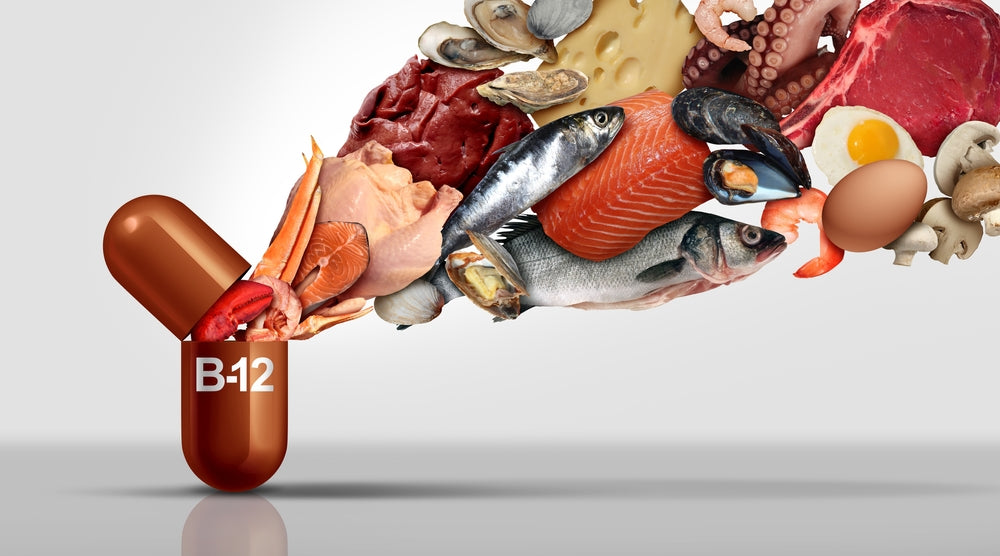Vitamin B12, or cyanocobalamin, is essential for many reactions in the body. For example, this vitamin has roles in heart health, energy production in the body, and the formation of healthy red blood cells, among others. Many people are low in vitamin B12, though, and the Vitamin B12 Energy Plus Patch by PatchAid is a convenient choice for a supplement if your healthcare provider recommends it. Here are 10 health benefits of getting enough vitamin B12.*
Normal Energy Production
Vitamin B12 is one of many vitamins and minerals that are necessary for getting energy from food. Fat, protein, and carbohydrates in food are the main sources of energy in your diet. To take advantage, you need to break them down, absorb them, and convert them into energy or fuel for your body. Without enough vitamin B12, your metabolism can be impaired.
Prevention of Anemia
Anemia is a shortage of healthy red blood cells in your body. There are many kinds of anemia, including several types of nutritional anemia, or anemia caused by nutritional factors. Vitamin B12 is necessary for your body to produce normal, healthy red blood cells. If you’re deficient, your red blood cells can be larger and misshapen compared to healthy ones.
Increased Ability to Exercise
Healthy red blood cells deliver oxygen to your cells. If you have anemia, you can be short of breath, especially when you are trying to exercise. That’s due to not getting enough oxygen throughout your body.
Normal Mood
Vitamin B deficiency is linked to depression and other mood disorders. It may be the result of vitamin B12’s role in serotonin metabolism. Serotonin is a neurotransmitter that causes feelings of well-being and happiness.
Heart Health
Vitamin B12 plays a role in protein metabolism, including in a cycle that helps metabolize a protein called homocysteine. Without enough vitamin B12 and folic acid, you can have excessive levels of homocysteine, which is linked to heart disease risk.
Fetal Development
High homocysteine levels are not only associated with increased risk for heart disease, but also with increased risk for birth defects. In particular, neural tube birth defects seem to be related. While folic acid supplementation has gotten a lot of attention for its role in lowering rates of neural tube birth defects, such as spina bifida and anencephaly, it is likely that vitamin B12 is essential for normal fetal development, including normal closure of the neural tube in early weeks of pregnancy.
Bone Health
Bone health is about more than just calcium, and even about more than vitamin D. It appears that vitamin B12 may be related to bone health and the development of osteoporosis, or low bone mineral density and higher risk for fractures. In particular, low vitamin B12 levels may be linked to lower bone mineral density. Though research is still ongoing, it may be a good idea to check whether you’re at risk for osteoporosis or low vitamin B12 levels.
Lower Risk of Macular Degeneration
Macular degeneration is a progressive condition that leads to poorer vision, and it’s yet another condition that may be linked to high homocysteine levels and low vitamin B12 levels. People with low vitamin B12 appear to be more likely to develop age-related macular degeneration.
Skin Health
Vitamin B12 deficiency can lead to a rash or scaly skin. That’s likely due to the role of vitamin B12 in supporting normal cell growth.
Prevention of Nerve Disorders
Vitamin B12 is needed for healthy nerve function. A deficiency can lead to peripheral neuropathy, with symptoms of numbness and tingling in the hands and feet. A severe case of vitamin B12 deficiency can make these symptoms permanent.
Who Needs More Vitamin B12?
Low vitamin B12 levels are relatively common compared to some nutrients. These are some groups of people who are at higher risk for vitamin B12, though it’s important to remember than anyone can develop a low-level deficiency.
- Strict vegans, or people who follow a plant-based diet. Vitamin B12 is only naturally in animal-based foods, such as meat, eggs, and dairy products. On a vegan diet, you might get it from fortified foods, such as some types of breakfast cereal.
- Bariatric surgery patients who are eating a restricted diet or who may have nutrient malabsorption.
- Older adults, who may have lower levels of enzymes that are needed to release vitamin B12 from food to allow for normal absorption.
- People with other nutrient deficiencies, such as people who are low in calcium. Calcium is needed for normal vitamin B12 absorption.
How do you know if you need more vitamin B12? You may have symptoms, such as fatigue or shortness of breath resulting from low levels of healthy red blood cells. Or, you might not have symptoms.
You can ask your healthcare provider for blood tests to check for a deficiency. Blood tests might measure the size, shape, and number of your red blood cells. You might also get your vitamin B12 levels checked directly. Your healthcare provider can help you interpret the results and help you decide if you need vitamin B12 supplements.
Easy Topical Patch for Vitamin B12
The Vitamin B12 Energy Plus Patch by PatchAid is an easy way to take vitamin B12.* It’s less painful than taking vitamin B12 injections, and there’s no risk of gastrointestinal discomfort related to digesting oral vitamin B12 supplements.
Each patch contains 1200 mcg of vitamin B12, along with the following B vitamins.
- Biotin
- Vitamin B12 (thiamin)
- Vitamin B2 (riboflavin)
- Vitamin B3 (niacin)
- Vitamin B5 (pantothenic acid)
- Vitamin B6 (pyridoxine)
- Folate
It also has choline, ginseng, and inositol.
The Vitamin B12 Energy Plus Patch may: *
- Support normal energy levels and metabolism
- Help maintain normal mood.
- Support heart health.
- Support normal hair, nails, and skin.
- Promote normal brain function.
Vitamin B12 is an essential nutrient that is often low, and the Vitamin B12 Energy Plus Patch by PatchAid is a convenient source. Ask your healthcare provider if you may be at risk for low vitamin B12, or if you may benefit from supplement, and then ask if the Vitamin B12 Energy Plus Patch may be right for you.
*The Food and Drug Administration has not evaluated these statements. PatchAid products are not intended to diagnose, treat, cure or prevent any disease. Anyone with a medical condition should seek the advice of a licensed medical practitioner. Individual results may vary.







